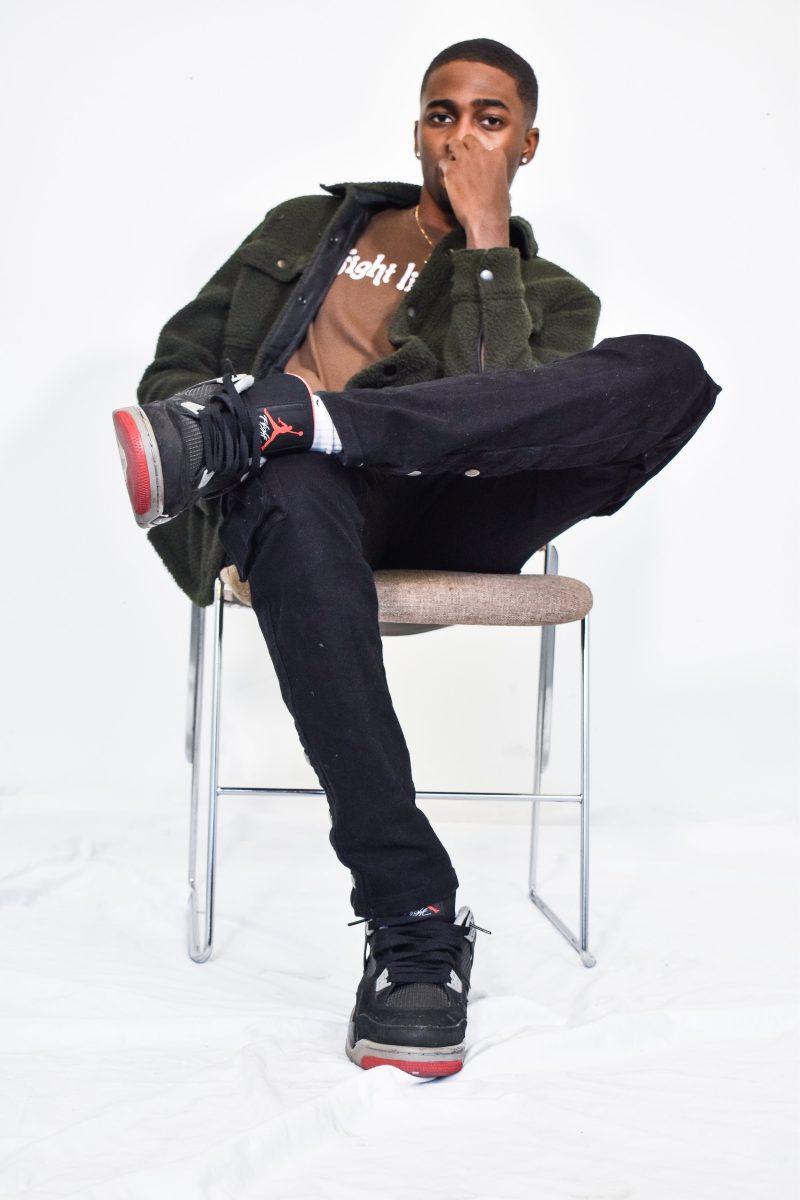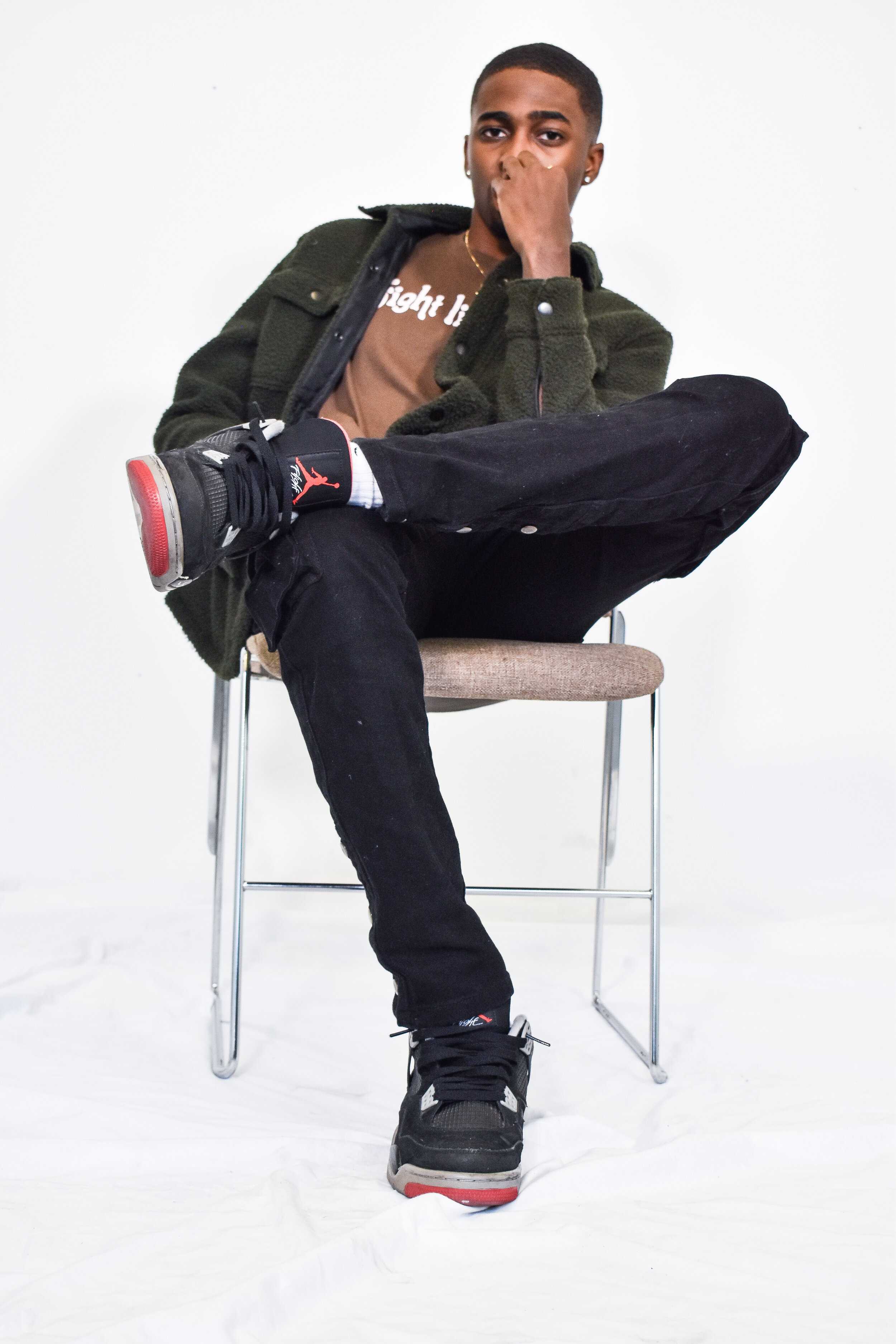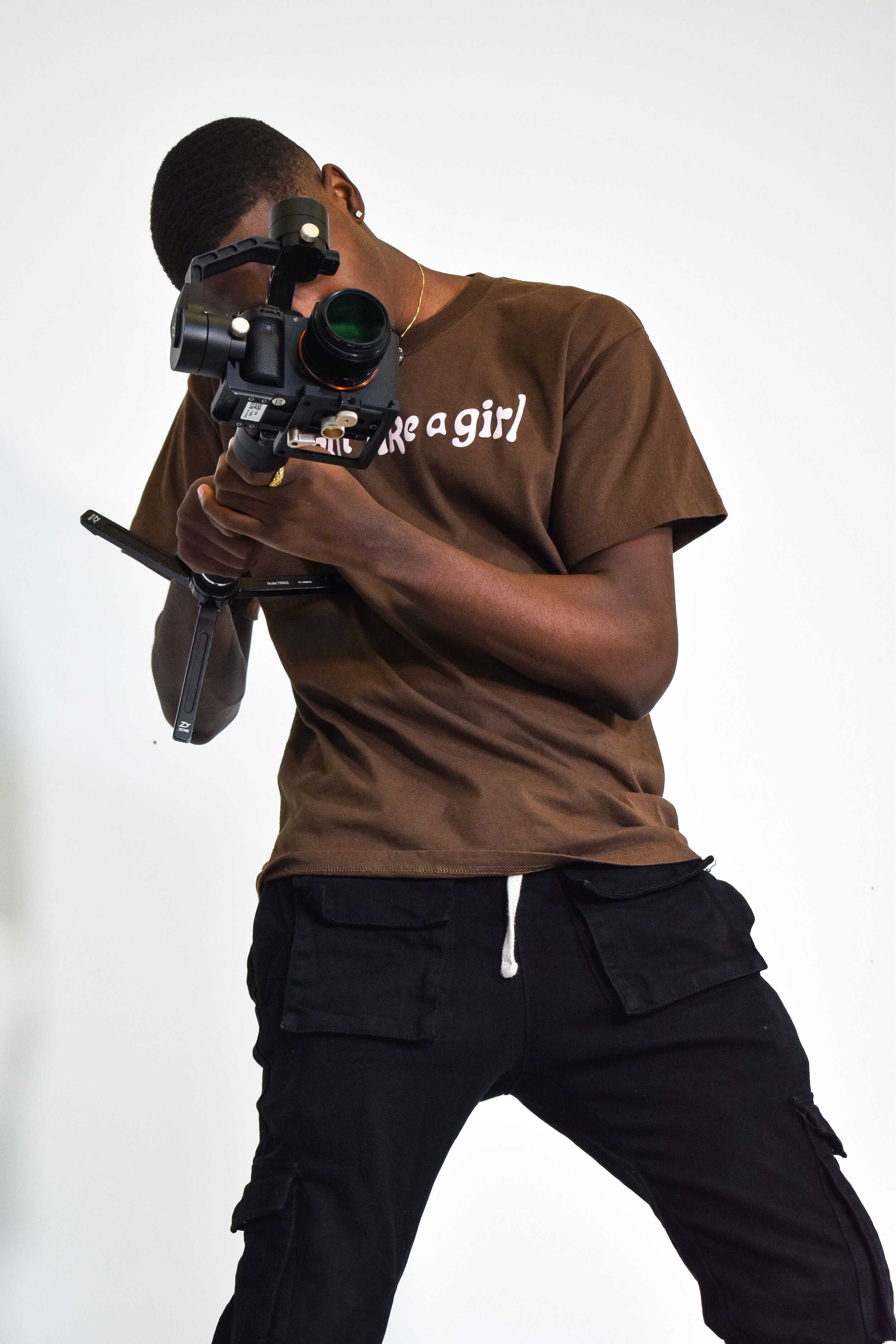To say life imitates art is true. Emmanuel King, a University of Texas at Austin urban studies sophomore, makes a conscious effort to record, shoot and direct every intentional moment of time that challenges the way in which he and others view the world. King, who also goes by the name “Manny Maserati”, is a Nigerian-American artist using the mediums of film, video and photography to redefine how people and their stories are told. A Houston native, King’s work acts as the bridge between adding voice to visuals, where he magnifies the various experiences and emotions of diverse individuals through the simplicity of a single shot.
Story by Gloria Akinnibosun
Photos by Veronica Thompson
Based in Austin, King links meaningful music to film by adding a piece of his “playlist personality” to every video he releases. Having filmed major projects for Travis Scott and Netflix, Young Nudy and Kendra Scott, in addition to making short films featuring the multi-talented faces of students who attend UT, he continues to challenge the scale of small and big projects that were once just pure ideas. His humble and inclusive nature in capturing the beauty of life in its entirety inspires others to do the same and discover their own art of becoming.
Responses have been edited for clarity and brevity.
—-
Q: Where did the name “Manny Maserati” come from? Was there a personal influence on this name?
When I was in middle school, it seemed like everybody had these cool Instagram names. Mine was just my first and last name, so people would call me Emmanuel, but it just seemed so professional and formal. Then one day in the summer, I played with nickname generators and put in “Emmanuel”. I saw “Manny” and said “Wow, that’s pretty cool.” I was looking for luxury brands that were foreign to attach to the end, so I looked up French words. I was just scrolling and saw “Maserati” and figured “Oh, Manny Maserati would be really cool.” When I changed my Instagram name, everybody at school just started calling me that, and it stuck.
Q: Where did this passion for storytelling, through film direction and photography, come from?
When I was about 9 years old, I got my first camera and took pictures of everything. At first, it was just a hobby. My older cousin had a camera, and I always saw him taking pictures. So, I got a camera and started doing the same thing. It wasn’t until high school when I started making money from doing shoots. When I got to college, I became interested in projects, writing and short films. I feel like a picture tells a thousand words, but a video can definitely tell so much more.
Q: When you look for subjects to shoot, what do you look for? Do you feel like the subjects you choose are purely based on an emotional connection to their life story or is it something to simply build your portfolio?
When I do projects of any type, there’s always an intended theme behind it. Besides (the) promos I do, I have projects like “Solo”, which was a short film highlighting the art of dance. There were underlying messages within the film that made it a memorable piece of work. Amanda Daniels, a journalism major and the subject of the project, talked about how dance was her safe haven and how it really made her forget her struggle with self-identity amid childhood. Dance was what she considered her self-expression in the truest form. For me, making videos is how I express myself, which is why I enjoy communicating messages through my work. So when I work with someone, I really ask of them to be vulnerable in showing their passions and identifying where that specific passion lies.
Q: Would you say your work is a platform used to solely showcase Black success, or do you simply use art to racially transform how all people are viewed?
I definitely touch on more than just race. I don’t only want to make work pertaining to the Black story and the Black experience. But that is a big part of my work catalog. I feel like media controls the way we see things. For many years, we have only seen Black people on the news for being shot, arrested (and) criminalized. They have a specific narrative built around simply being Black, not only in America but all around the world. I’m trying to make as many videos of my fellow people who are aiming to change the narrative of Black people being more than their pitfalls.
Q: We’re both Nigerian, and I know there is a lot of familial pressure to follow medicine. Have you ever felt a sense of regret with choosing film direction and photography over a STEM-based career path?
Honestly, no. I’ve never had that regret. Of course, in a lot of creatives’ minds, they feel like they aren’t doing enough because they don’t have this big $30,000 signing bonus or aren’t readily getting the internships that STEM kids may get. A lot of the stuff I do is extremely unorthodox. It’s something that I like to do. I don’t think I’d really choose any over path over it.
Q: Who are your photographic influences?
Cary Fagan. He works with Solange, i.e. the “Almeda” music video from “When I Get Home” and helped with visionary work and creative direction. That neo-soul, that new school type feel, that Black aesthetic― Solange is all about it. I also really do love French styles. I honestly just draw inspiration from a lot of things for certain categories. For concerts, I look at Gibson Hazard’s work and he has a lot of animation content. It’s rowdy and raw but I like it. I actually did that with my Young Nudy video. When it comes to project direction, I tend to grab inspiration from UT alum, Jared Malik Royal. His work is insane to me. It’s like “Wow, not too long along, you were in my shoes and you were my age.”
Q: You mentioned Young Nudy, a very popular and rising rapper of this age. Being that you’re still young, how does it feel to have directed or been a part of projects for huge names in the music industry?
The work I’ve done with these artists, it does seem kind of surreal in the moment. One minute, I’m standing next to Travis Scott filming his event. Next minute, I’m on stage with Nudy and filming with Stunna. It’s all very surreal and super crazy to me. Just a couple years ago, I was taking birthday photoshoots for people for $20 and now I’m getting paid to film stuff on a grand scale like this.
Q: What do you love most about capturing people’s best moments?
When I modeled at a much younger age and people would take pictures of me, I felt extremely great about myself because of how nice they’d look. When I made “Solo” with Amanda, she showed her mom, and she couldn’t stop raving about how much she loved it. I’m trying to make super professional works with everyday people. That’s honestly the purpose behind my videos. I want to show what it means to be human―not necessarily what it means to be Black or white, but what it means to live the human experience. I strive to make all my content look really good, so that people can also feel good about themselves, what they do, and their passions.
Q: The way in which your passions permeate and bleed through the work you produce is pretty dope. I asked about your photography inspiration, but you’re also in film direction. Who would you consider your film inspiration? Would you ever consider doing film production full-flesh?
When I finally reach my own career climax, I actually want to have my own production company. Tyler Perry actually just opened up his own studio, and I consider that an inspiration. When it comes to directing, I love being in control of what is being shown on the screen. Jordan Peele is really great at that, and his movies show for it.
Q: Just out of curiosity, when you get to that point, is there is specific location you’d want your production studios to be based? Considering that you were born and raised in Houston, would you say that the city is a catalyst for growth, and a place you’d want to continue a career?
I don’t know, Houston is just so different. I do like it but it just feels really slow. It’s probably because I’m not at the place I want to be yet, so I don’t have access to everything I wish I did have access to. Typically, people in my field usually move to like Los Angeles or New York City, since those are like the really big artistic hubs for creatives. However, growing up, I knew so many other people like me―not just in film, but in music, dance and more―who didn’t necessarily have the resources or exposure. To have a specific place for freelancers to get put on and gain their deserved recognition is important, because it’s so hard to get noticed from the ground up with nobody around to plug you in along the way. It’s just you, your work and self-marketing. I feel like it will definitely be an easier process when there’s someone on the home team playing with you, that does have that pull. So definitely, I’d still have some roots in Houston.
Q: Tell me about your cultural background and how it may play into your present interests and aspirations.
Everyone thinks I’m like super Americanized, but I grew up in a very traditional Nigerian home―strict parents, strict values, strict on career paths to take, Nigerian parties habitually, with church every Sunday and Wednesday. I did it all man. I played in the church band and everything. I feel like growing up Nigerian, faith and religion are a very big deal. Christianity is extremely talked about, so I think a lot of my values are solely rooted in my culture, and I don’t think they would exist had I not been Nigerian. A lot of the times, it’s really just me, my brother, my sister and my mom. I’ve had experiences with a divorced household, with arguments daily, so a lot of the pain and things I’ve had to undergo have definitely contributed to my work. Overcoming and persevering through every type of challenge is very much portrayed in my projects.
Q: Any final words you would like to part with?
Be yourself no matter what. Don’t change for anybody. Don’t try to forget where you come from. All of those things play a big part in who we are and what we will become. Stay 100% true to who you are, and never let anyone change that.













































